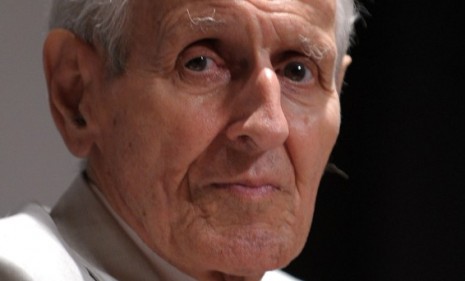Jack Kevorkian: Hero or murderer?
The nation's most controversial advocate of legalizing euthanasia dies — in a hospital, of natural causes. What will his legacy be?

A free daily email with the biggest news stories of the day – and the best features from TheWeek.com
You are now subscribed
Your newsletter sign-up was successful
Jack Kevorkian — the assisted-suicide advocate known as "Dr. Death" — died peacefully at a Michigan hospital on Friday, at age 83. Kevorkian admitted to helping more than 130 terminally ill people commit suicide between 1990 and 2000, using injections, carbon monoxide, and his notorious "suicide machine." Things got complicated in 1998 when he recorded his role helping a man dying of Lou Gehrig’s disease commit suicide. Kevorkian was arrested, convicted, and sent to prison for second-degree murder, then paroled in 2007 after promising not to assist in any more suicides. Should he be remembered for killing people, or for helping people end their pain with dignity?
His own death proves Kevorkian was just a murderer: Jack Kevorkian was nothing but a serial killer, says Mark Noonan at Blogs for Victory. "If he was in any way sincere about what he did, he would have hooked himself up to one of his own infernal machines and offed himself when it became clear there was no cure" for his kidney and heart problems. But he went to a hospital, which is where "you go when you want someone, somehow, to keep you alive," because you know life is precious, not something to be thrown away.
"Kevorkian: Nothing but a common murderer"
The Week
Escape your echo chamber. Get the facts behind the news, plus analysis from multiple perspectives.

Sign up for The Week's Free Newsletters
From our morning news briefing to a weekly Good News Newsletter, get the best of The Week delivered directly to your inbox.
From our morning news briefing to a weekly Good News Newsletter, get the best of The Week delivered directly to your inbox.
Kevorkian was a flawed but merciful man: "For some patients, a clean, painless death is truly the greatest mercy that can be offered," says Matt Gurney at Canada's National Post. Kevorkian's machine allowed people who were suffering intense agony to die on their own terms — if they chose to flip the switch. He "became arrogant," of course, and that's what brought him down, but "Kevorkian started off on solid ground."
"Kevorkian's ghastly hubris undermined his worthy cause"
Love him or hate him, Kevorkian made a difference: Both Kevorkian's supporters and critics can agree on one thing, says Keith Schneider in The New York Times. His "stubborn and often intemperate advocacy for the right of the terminally ill to choose how they die" triggered a boom in hospice care in this country. It also forced physicians to become more sympathetic to their patients' pain, and "more willing to prescribe medication to relieve it." That might be his most important legacy.
"Dr. Jack Kevorkian dies at 83; backed assisted suicide"
A free daily email with the biggest news stories of the day – and the best features from TheWeek.com